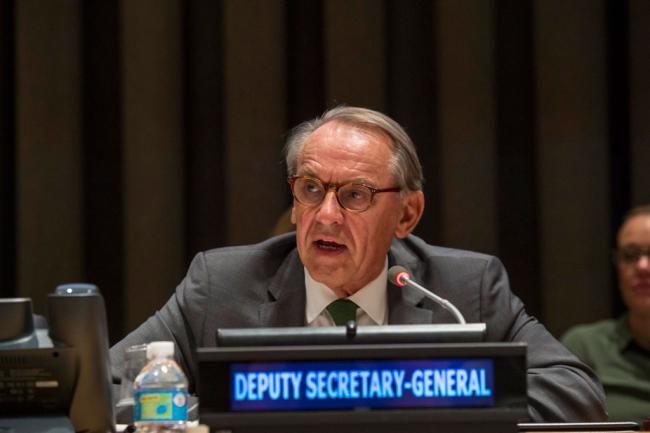
Despite high hopes, ‘responsibility to protect’ not yet fully operationalized – UN deputy chief
“We have seen concrete implementation plans to make the ‘responsibility to protect’ a living reality,” Deputy Secretary-General Jan Eliasson said at a UN General Assembly interactive dialogue on the subject.
In his remarks to the gathering, Eliasson flagged that he had served as President of the General Assembly in 2005, when the R2P principle was adopted by Member States. “This commitment was a signature achievement for the United Nations,” he said.
Much of it was already embedded in the international human rights obligations of States, he noted. But subsequent events, such as unconscionable brutality against civilians around the world, have underlined the need to articulate and affirm this important principle and place it more prominently on the international agenda.
“Sadly, we have yet to fully operationalize the responsibility to protect principle, agreed with such high hopes and expectations in 2005,” he said, highlighting points from this year’s report of Secretary-General Ban Ki-moon which will be critical to overcoming implementation barriers.
Sadly, we have yet to fully operationalize the responsibility to protect principle, agreed with such high hopes and expectations in 2005
First, the Deputy Secretary-General pointed out, prevention must be taken more seriously. “The call for prevention is not a rhetorical call; it is a call to action to all States, organizations and other stakeholders,” he said
Effective prevention requires foresight and serious analysis as well as constant attention, support and political will, he said, noting that it means integrating a prevention agenda into national, regional and international frameworks for action. It also requires additional institutional capacity, he added.
Second, the Deputy Secretary-General observed, there is a need to be more effective in preventing the recurrence of atrocity crimes. The international community must support national authorities in addressing root causes and build or strengthen the ways to counter atrocity crimes – such as by inter-communal dialogue, reform of the security sector, and mechanisms for reconciliation and transitional justice.
“The time has now come to seriously counter and confront crisis and potential crisis situations,” he said. “There are millions of people looking to the UN for help in time of dire need, conflict and distress. In the name of humanity and in the spirit of the UN Charter, we must not fail them.”
Also addressing on Tuesday’s dialogue was the current President of the General Assembly, Mogens Lykketoft, who recalled that, in a 2009 report, the Secretary-General proposed a strategy for the implementation of the responsibility to protect based on three equal, non-sequential, and mutually reinforcing pillars: the State’s responsibilities to protect; international assistance and capacity-building; and timely and decisive responses.
Last year, the General Assembly’s informal interactive dialogue on the subject focused on an assessment of progress in the first decade of the R2P principle, he said at the meeting’s opening segment, noting that this year’s dialogue focuses on the obstacles to mobilizing collective action to prevent and respond to genocide, war crimes, ethnic cleansing and crimes against humanity, and how such barriers might be overcome.
The task of strengthening preventive strategies, providing timely and decisive response, preventing recurrence and renewing the institutional capacity to prevent and respond, is of the highest ambition, he said.
“The plight of suffering populations and vulnerable communities requires no less,” he added.
UN photo/Cia Pak
Source: www.justearthnews.com
Support Our Journalism
We cannot do without you.. your contribution supports unbiased journalism
IBNS is not driven by any ism- not wokeism, not racism, not skewed secularism, not hyper right-wing or left liberal ideals, nor by any hardline religious beliefs or hyper nationalism. We want to serve you good old objective news, as they are. We do not judge or preach. We let people decide for themselves. We only try to present factual and well-sourced news.







